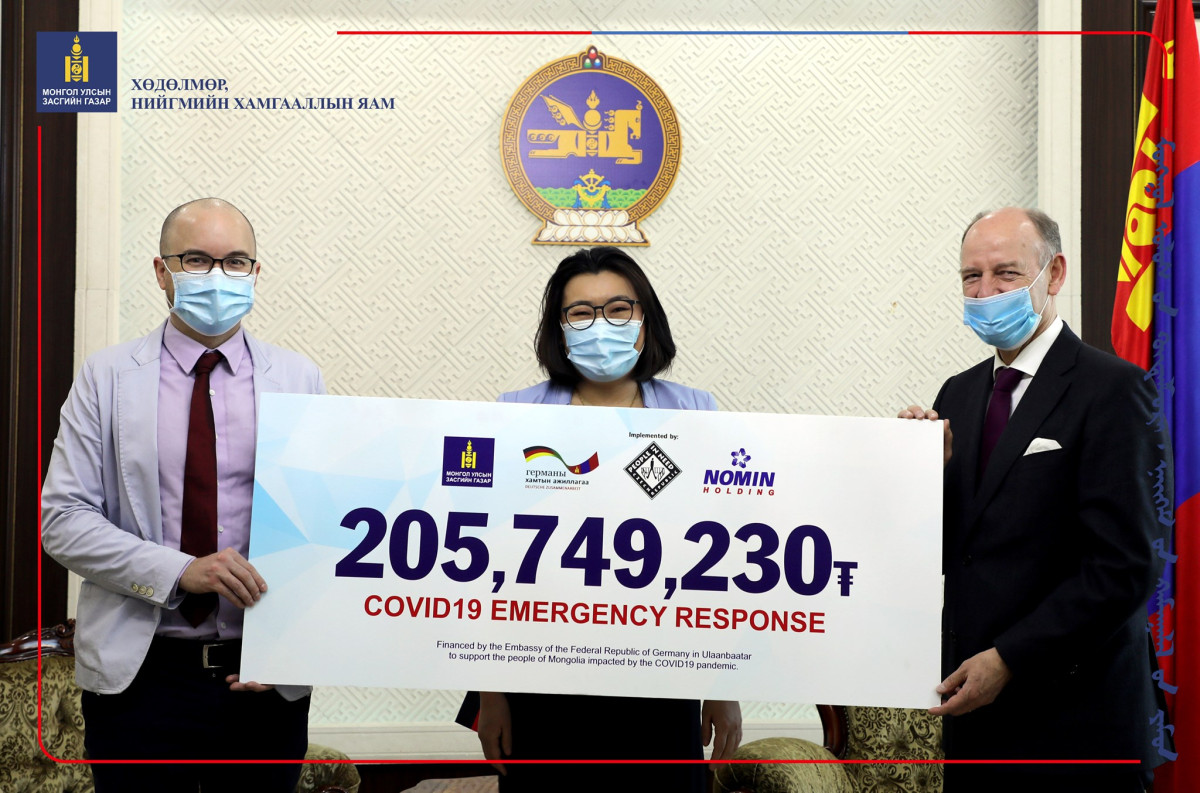German Embassy, SDC support families in “Leaving No One Behind” Emergency Relief Project.
Published: Jun 26, 2021 Reading time: 4 minutes Share: Share an articleHuman Interest Story

“There are a lot of difficult issues [due to COVID19] for people living with disabilities, both emotionally and mentally. They are in dire need of day-to-day necessities,” says Ch.Undrakhbayar, head of the "Universal Progress” Association for People with Disabilities.
News of the first domestic coronavirus transmission resulted in a nationwide lockdown on November 13th, 2020. Grappling with the COVID-19 pandemic and strict lockdown measures, thousands of families across Mongolia are on the verge of slipping back into poverty. According to the World Bank, Mongolia’s poverty rate before the pandemic was at an estimated 28.4 percent.
The “Universal Progress” is one of the many centers that are struggling to reach out to people.
“For our center – our operations have fully come to a halt for the past 4 to 5 months. As a direct result, our daily activities, services, and crucial trainings for people with disabilities have stopped. This further affects the social participation of these people as well,” Ch.Undrakhbayar continues.
To bring relief to so many families on the brink of poverty, as well as to those most vulnerable, People in Need (PIN), launched an e-voucher programme – a 4 step process, where beneficiaries are able to choose essential items based on their individual needs.
Fully funded by the Embassy of the Federal Republic of Germany to Mongolia and the Swiss Agency for Development and Cooperation, the Ministry of Labor and Social Protection and PIN were able to provide immediate assistance with such e-vouchers to 1,598 people and their families, specifically students living in dormitories, persons living with disabilities, and other vulnerable groups who are severely impacted.
The project provided target communities, most impacted by the Covid-19 pandemic prevention measures with a food and basic essentials e-voucher with a value of 100’000 MNT to redeem at a supermarket, as well as a pharmaceutical e-voucher respective of their health status.
“Access to food, healthcare, and security is a fundamental human right that we should work together to protect. Only together, we can truly build back better,” said H.E. A. Ariunzaya, Ministry of Labour and Social Protection.
This voucher-based assistance is the first of its kind to be successfully implemented in Mongolia. The programme offers vulnerable people affected by the pandemic a maximum degree of choice, flexibility and dignity. There is also growing evidence that it is more cost-efficient and cost-effective to meet multiple needs.
There are numerous benefits of a voucher-based program such as safety, with no human contact when providing the assistance, eco-friendly, as e-vouchers are sent directly as a text message to mobile phones, gives the freedom of choice in selection, allows for easy pre/post monitoring, supports local front-line workers and it saves on time.
“There were many messages of people expressing their gratitude. This support came just in the right time. People with disabilities have a lot of needs that need to be taken care of. For example, they need to be able to get everything from catheters to medicines to household items. This response gave them the choice to select items based on their personal needs,” continued Ch.Undrakhbayar.
The programme also included students struggling to make ends meet due to the strict Covid-19 prevention measures. When Ulaanbaatar closed all roads that connect cities, young students were stuck and unable to work or reach their families in the countryside.
“I am 24 years old and live in a rented apartment. I am currently studying welding but online classes are poorly done and it’s difficult to understand. Classroom seminars and trainings are much more effective. I lost my job due to the pandemic. I am wasting so much time and because of unemployment, my financial situation is difficult,” says U.Altantulga, a student at VETP.
Many students at the Vocational Education Training Partnership (VETP), a non-governmental organization established in 2013, found themselves stranded in the capitol city of Ulaanbaatar, dispersed between living in dormitories or sharing rooms in rented apartments.
"I take sewing classes at the VETP but with this pandemic it’s sometimes difficult to study because there are times when I do not have internet data. I live with grandmother and I don’t work so living standards are declining due to the inability of my family members to work,” shares one 16-year-old student A.Sarangerel.
“On behalf of the Government of Mongolia, I would like to extend our sincere appreciation to People in Need, the German Embassy and SDC in Mongolia for supporting dormitory students, persons with disabilities, and other vulnerable communities with vouchers for food and basic needs. During this time of great uncertainty, we've been comforted, encouraged, and humbled by the outpouring of generosity and support,” said HE A.Ariunzaya, Minister of Labour and Social Protection.

